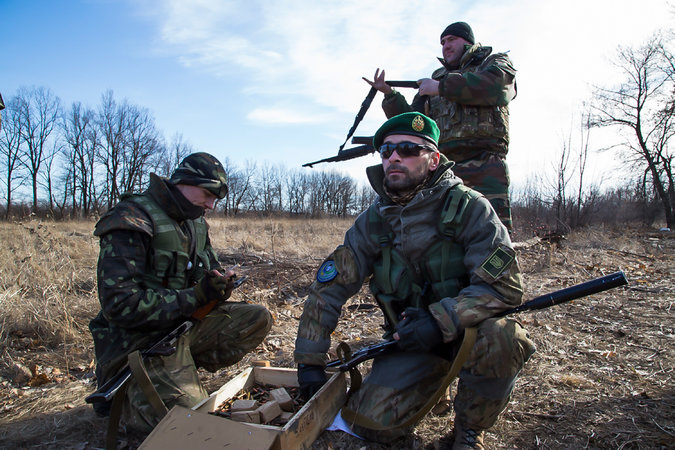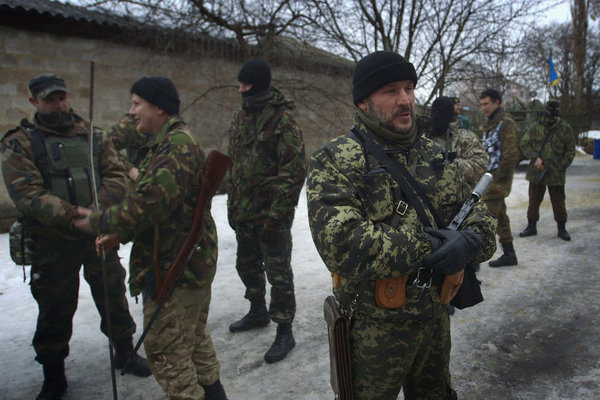SIMFEROPOL, Crimea — Eight months into the Russian annexation of the Black Sea resort region of Crimea, traces of Ukraine’s 60-year rule here are rapidly being wiped away. Now Ukrainians themselves worry that they are next.
The Ukrainian language has vanished from school curriculums, Russia’s two-headed eagle has been bolted onto government buildings, and Russian laws are slowly taking hold. And as the peninsula Russifies, Ukrainians and other minority groups are finding that an area once renowned for its easygoing cosmopolitanism is now stifling. Some are fleeing their native home.
Many complain that they have been written off both by the world and by Ukraine itself, which is focused on the bloody conflict in its southeast. The turmoil is a harsh consequence of the first major land grab in Europe since World War II — and it comes despite Kremlin assurances that life would be better in Crimea for Russians and Ukrainians alike.
The Ukrainian Orthodox Church has quickly become a haven for Ukrainian speakers in Crimea, who can gather on Sunday mornings to gossip and to send up prayers in sanctuaries whose authorities sit in Kiev, not Moscow. But Archbishop Kliment, the leader of the church here, fears for his future.
“I get up worried, and I go to bed worried,” he said, speaking in the converted school building in Simferopol that houses the church headquarters on this peninsula of 2.4 million. “They are closing down Ukrainian schools, Ukrainian newspapers. It’s all closed, and the Ukrainian church is the only thing left.” One poll taken when Crimea was still part of Ukraine found that about 12 percent of Crimean residents, or 280,000 people, identified as Ukrainian Orthodox.
“illegitimate.”
Well I think it is no secret that Putin wants to put together the old Soviet regime. No doubt so he can rule over all. He is a thinly veiled dictator, "apparently President for life." Who knows where his dreams of domination will lead? He is a bit like Hitler without the firey rhetoric.
Many ethnic Russians were excited to join a richer nation that promised them a higher standard of living. In a March referendum, 97.6 percent were said to have voted to join Russia. Critics questioned the validity of the results, and opponents largely
boycotted the voting. Now they say that an entire constellation of life is swiftly fading away.
Some say they have no future in Crimea. Darya Karpenko emptied her Simferopol apartment and sold her Nissan this month, setting out last week with her 2-year-old daughter to join her husband in the Polish city of Krakow. Even though she is ethnically Russian, she said there is no future for her family in the city where she was born.
“I feel almost like I’m jumping on the last train car that’s leaving,” Karpenko said, shortly before she left for Poland. “We never planned our lives to leave. We bought a very nice apartment. We renovated it. We filled it with expensive furniture. We lost everything here. My husband works in IT. There were 50 small companies in the city, and they’re all closed now.”
Before the Russian annexation, Karpenko ran a popular blog and was a business consultant in Ukraine. Since the takeover, she said, she posts cautiously on her Facebook page, worrying constantly about Russian security services.
experience as eastern Ukraine — although that conflict was sparked by pro-Russian separatists seizing local government buildings, not by the central government in Kiev.
“We felt we had been in internal immigration. I am a Russian person,” said Alexander Burtsev, the director of a children’s art school in Sevastopol, the port city that is home to Russia’s Black Sea Fleet. “Our lives have become better,” he said. “Financially better and morally better. Especially morally.”
Local authorities have promised him a new building for his art school, whose students learn painting and sculpture on rickety Soviet-era wooden stools.
Those who complain about the transition period, Burtsev said, are simply being impatient. “Times aren’t easy, because we’re switching from Ukraine to Russian legislation,” he said. “But it’s a temporary problem.”
Authorities say they will smooth out the bumps that have accompanied the peninsula’s switch to Russian rule. They say that there is room for minorities to live in Crimea so long as they live within Russian laws.
“Ukraine has been an angry stepmother for Crimea,” Crimean Prime Minister Sergei Aksyonov, the top Russian official in Crimea, said in written replies to questions. “To make Crimea self-sufficient is our strategic aim. We plan to reach this goal in five years,” and Moscow has pledged $15.5 billion to that end, he said.
As for the Ukrainian Orthodox Church, he said that no other churches recognize it. Its future appears to rest on whether it is allowed to register in Russia, an unclear prospect.
Archbishop Kliment says he will fight as long as he can. “Until the last Ukrainian leaves Crimea,” he said, “we need to be here with them.”
Eight months after Russia annexed Crimea from Ukraine, a complicated transition - The Washington Post
To much Vodak makes you act inappropriately.














